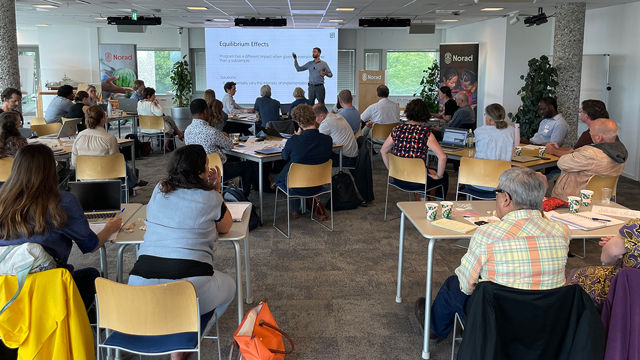Invitation to Impact Evaluation Incubator 2023

Norad wants to increase the use of impact evaluations in Norwegian development cooperation, in order to enhance knowledge and learning. We are pleased to invite organisations with an agreement with Norad to apply for participation in a 3-day impact evaluation incubator on December 4–6.
Organised by Norad in cooperation with Development Learning Lab (DLL) & International Initiative on Impact Evaluations (3ie)
Venue: Norad’s office in Oslo, Norway.
During these three days, researchers from DLL (www.devlearnlab.no) and 3ie (www.3ieimpact.org) will guide participants step-by-step through the process of designing impact evaluations of projects of the organisations’ own choice. Participants will learn about best practice in impact evaluation and how to address practical challenges.
Norad will invest in more and better knowledge production in the aid portfolios over the coming years. As part of this, there will be more funding available for impact evaluations. The incubator will prepare participating organisations to seize these opportunities.
We invite 4–5 participants from each organisation. The incubator will be held in English, and we encourage applicants to include staff from implementing organisations with good knowledge about the project and the context in which the project is implemented.
Requirements: Basic knowledge of concepts within impact evaluation is an advantage but not a requirement.
Participation for the full three days by all participants is necessary to take full advantage of the incubator. We prefer that organizations attend physically, for the best learning experience, but hybrid format (some participants in Oslo and some online) is accepted.
Costs: Participation is free of charge. Organisations must cover their own travel expenses.
How to apply: Fill out the application form below and send it to eivind.moe.hammersmark@norad.no.
Deadline for applications: October 10 2023. A limited number of applications will be accepted.
Examples of topics that will be covered:
- What can we learn from impact evaluations?
- Using theories of change to develop good evaluation questions
- Designing impact evaluations: Randomized and quasi-experimental designs
- Indicators and measurement
- Addressing implementation challenges
- Sample size and power calculations
What does a good application look like?
Successful applications will demonstrate the potential to conduct an impact evaluation with high information value and learning potential.
Potential to conduct an impact evaluation:
- It is possible to identify a credible control group.
- The project has sufficient size (i.e., number of individuals/households/communities targeted) to allow for robust quantitative analysis.
- It is possible to conduct a baseline to the proposed measure (which could be a new initiative, or an expansion or a change of an ongoing project).
- Alternatively, baseline data of good quality do already exist for both intervention and control groups OR it can plausibly be argued that the outcomes of interest were identical in the intervention and control groups before the measure was implemented.
High information value and learning potential:
- Findings will be relevant for the organisation or others in informing improvements to the current project design and/or in future portfolio and policy decisions.
- Existing evidence of impact is limited.
- High degree of certainty that the project can be successfully implemented.
- The intervention addresses an important problem and can be brought to scale.
Questions?
Norad is committed to assisting all our partners and other organizations in enhancing the knowledge foundation of their development and humanitarian initiatives. Actors unable to attend the incubator, or whose application is not accepted, can access learning material and presentations from our previous impact evaluation incubator here: Learning Materials (devlearnlab.no).
Questions can be directed to eivind.moe.hammersmark@norad.no.